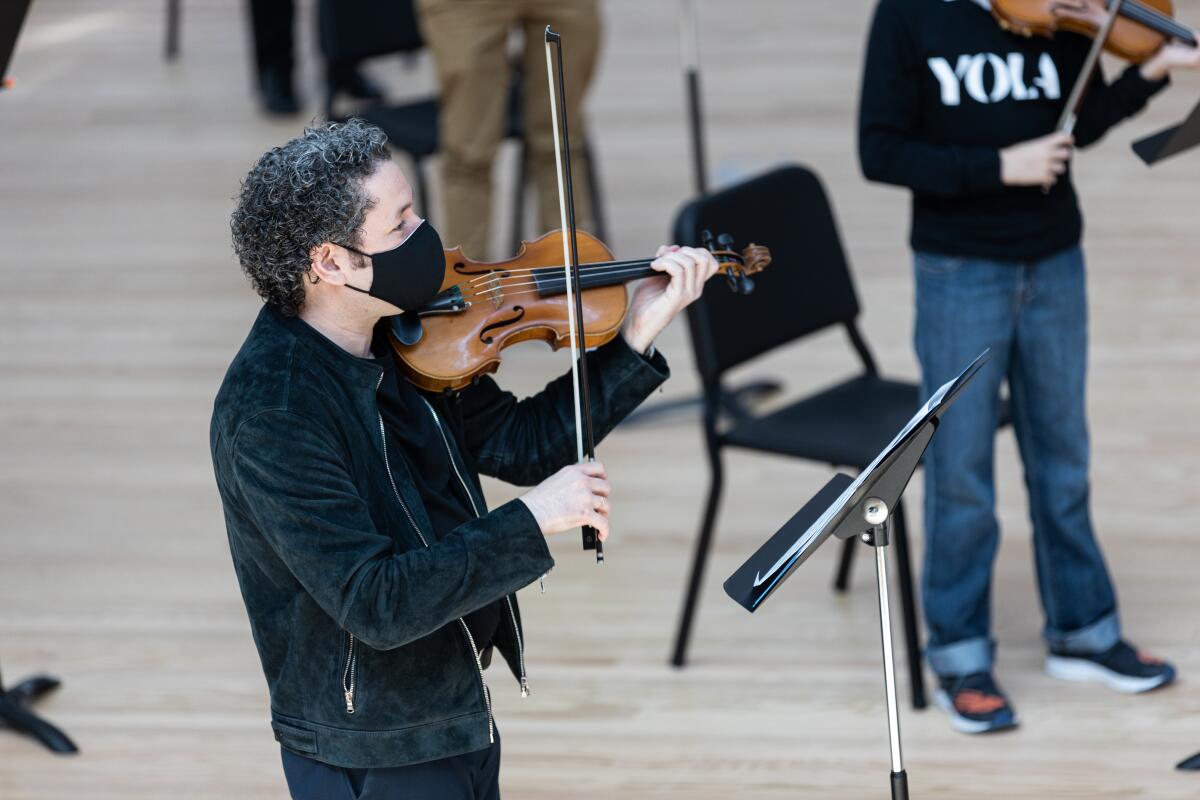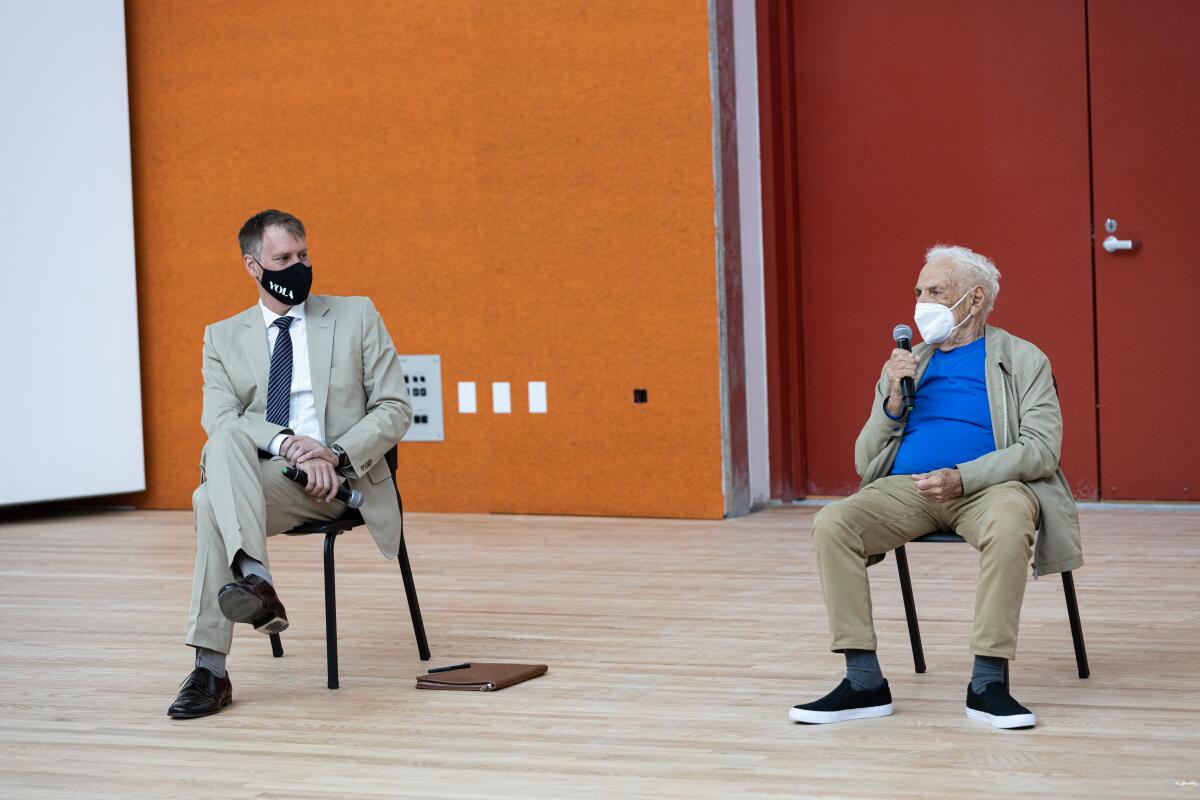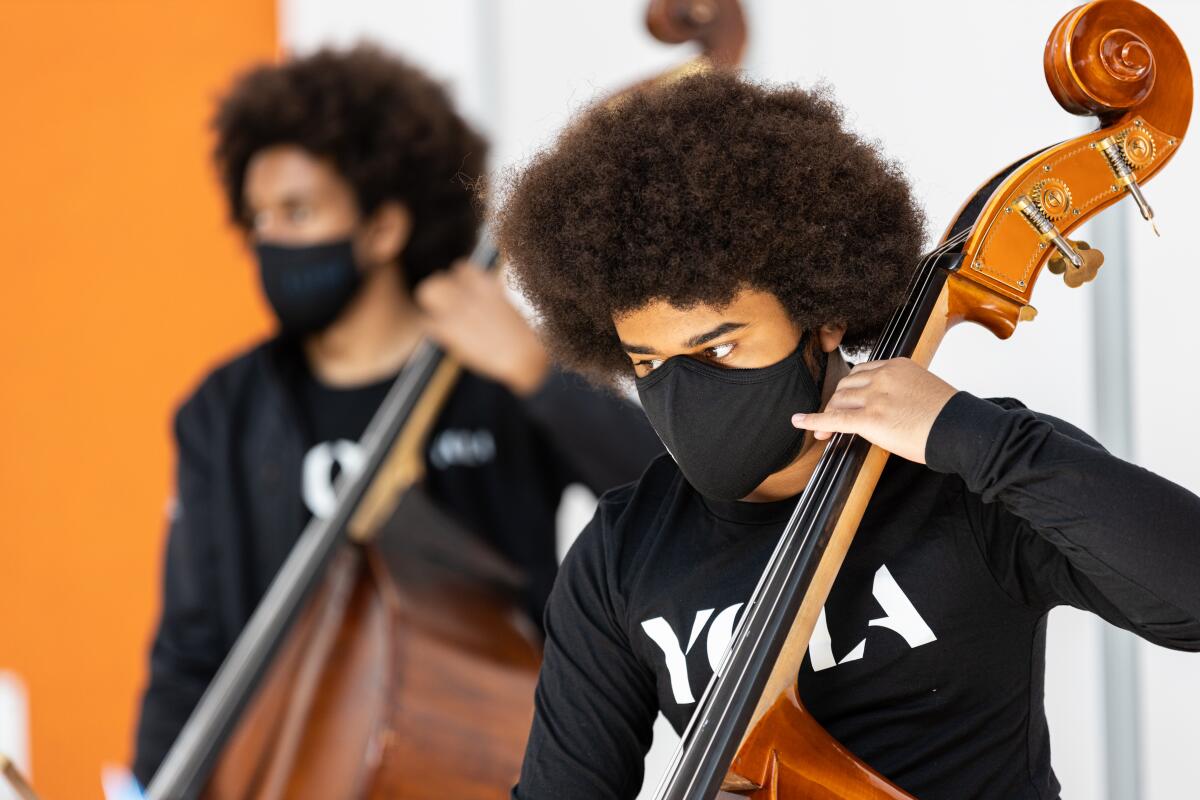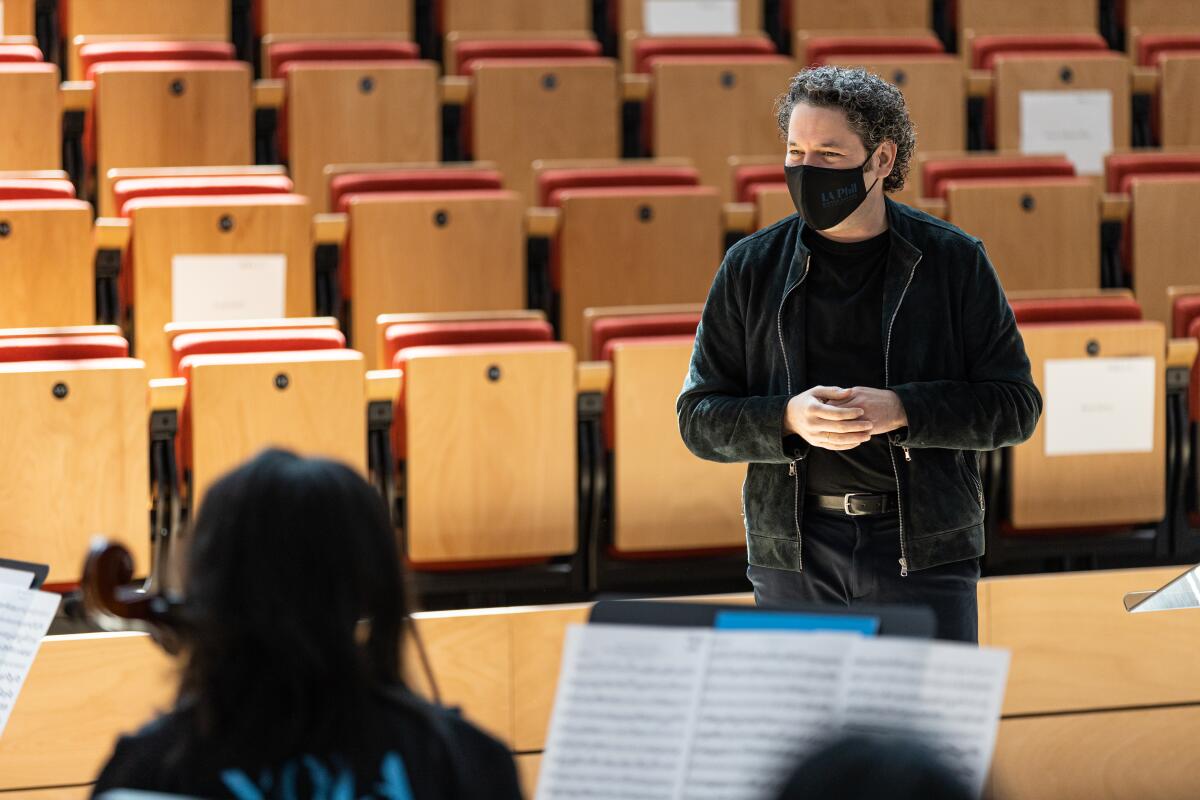Gustavo Dudamel and Frank Gehry give YOLA’s new Inglewood concert hall a sound check

The kids have entered the room.
The Los Angeles Philharmonic and its Youth Orchestra Los Angeles recently tried out the nearly completed Judith and Thomas L. Beckmen YOLA Center. That is the dilapidated former bank building and Burger King in downtown Inglewood that architect Frank Gehry has transformed into a fabulous performance space and teaching facility for young musicians.
For the record:
12:37 p.m. May 31, 2021A previous version of this story said the Youth Orchestra Los Angeles string players performed Bach’s Fourth “Brandenburg” Concerto. They played the Third.
A couple of dozen YOLA string players became the first to play in the venue last weekend, when they rehearsed for a few minutes with Gustavo Dudamel during a preview of the building for donors and civic officials. The next morning, Dudamel led a full rehearsal as part of the initial acoustic test with live musicians.
It would be hard to imagine a less proper acoustic assessment, or a better real world one. The ensemble of student string players spent the pandemic practicing at home and taking instruction via Zoom. Yet their assignment, on only their third time back together, was the tricky first movement of Bach’s Third “Brandenburg” Concerto. This also happened to be their introduction to a new hall with a startlingly lively presence unlike any venue they’d ever experienced.

The room itself isn’t quite ready. Acoustical paneling behind the stage that absorbs and refines the sound has yet to be installed. Every mistuned note, every missed-by-a-millisecond rhythmic attack, has the potential to become an aural slap in in the face.
The hall’s celebrated acoustician, Yasuhisa Toyota, who gave us the game-changing sound of Walt Disney Concert Hall, could not be present. He was unable to travel from Tokyo because of the coronavirus surge in Japan. Two trusted associates, instead, are overseeing the acoustical work for now.
I have a half-baked acoustical theory for new concert halls. If anything at all sounds OK at first, then you can figure that the hall will work, no matter how troubling its defects. Toyota, who is the most mysteriously patient of acousticians, is even more radical. His notion is simply to wait. If nothing is terribly wrong, he leaves it up to musicians and audiences to come to terms with a space. He gives as much credit to the psychoacoustics as to physical acoustics, convinced that how you feel about your environment invariably colors how you hear and how you make music.
For all these reasons, it is far too early for responsible evaluations of the BYC, as the L.A. Phil has begun abbreviating it. But this much I can vouch for from a first impression: I have never been in a more agreeable place in which to receive music. A beguiling physical structure, a purpose to serve both the needs of its community and the future of music, and a getting-down-to-essentials spirit, along with spectacular sound, magnify music and the joy of its making.
There will be plenty of opportunity to explore the innovative aspects of the Beckmen YOLA Center when it’s ready to begin welcoming students. That will likely be by September. Pedestrians will walk by on South La Brea Avenue, look through the BYC’s glass, and see students rehearsing and performing. The kids will have practice rooms full of natural light and equipment linking them with mentors around the world. Not to mention such Gehry inhabitable touches as seductive curves, alluring hallways, homey wooden benches and windows where you least expect them.
The performance space has an oak stage that’s the size of Disney Hall’s. Wooden seats on risers accommodate 260. Those seats are designed to collapse into the floor. An acoustically isolating wall can be rolled out to divide the space into two rehearsal rooms that can be used at the same time.
Coronavirus may have silenced our symphony halls, taking away the essential communal experience of the concert as we know it, but The Times invites you to join us on a different kind of shared journey: a new series on listening.
Bach’s Third “Brandenburg” was not the first sound in BYC. A week earlier, the acousticians blew up a paper bag and smashed it. That was described as a startling explosion — sound that gradually filled the full space and then remarkably fell to the ground. Apparently, that’s what it’s supposed to do and seems like it could be an impressive way to start a concert.
As for the “Brandenburg” movement, it proved symbolic for Dudamel. He told the young musicians that he fell in love with it as a kid violinist in Venezuela’s El Sistema program, on which he modeled YOLA.

Dudamel had the players stand, as was the fashion in Bach’s day. For the next day’s rehearsal, he conducted from various places in the hall. He asked for the quietest of quiets and the crunchiest of climaxes. “Don’t play to the stands,” he instructed the violins and violas. “Articulation,” he warned, “should never be comfortable; always play on the edge.” BYC is not for the meek.
The result was that there could be no escaping Bach. It is a hallmark of Toyota’s acoustics, and most notably in his collaborations with Gehry, that the audience and the musicians feel they are in the same room, making direct eye and ear contact. This could wind up being the most extreme — and exciting — case of that.
Through it all, Toyota’s associates listened. Otherwise, they did little, and one of them, Motoo Komoda, told me he had no intention of doing anything. He let Dudamel do all the work. And within an hour, this movement of the Third “Brandenburg,” like that paper bag, had developed an explosive character.
Afterward, I listened to the 1977 L.A. Phil recording of the concerto conducted by Pinchas Zukerman, a lovely performance that recently was remastered into glowing hi-res sound, through telling and immersive electrostatic headphones and a warm tube amplifier. YOLA can’t possibly be expected to rival that kind of luxurious aural polish. But the recording, in this best of circumstances, proved a pale, coffined reflection of what it was like to be in the living Beckmen YOLA Center.
The Los Angeles Philharmonic and Frank Gehry on Wednesday unveiled designs for its YOLA Center, a former bank building that the architect will remake into a 25,000-square-foot youth orchestra hall and performance space in Inglewood.
The hall is, thus far (and again it is too soon to tell), on the bright side. But true to Toyota’s contention, the players instinctively, and with a little help from their conductor friend, toned that down as they got used to the acoustic. When the panels are installed and the seats filled, there will be further muting.
The other acoustic test was with a quartet of L.A. trombones playing Wagner, Berlioz and Gershwin. This was the big, brassy sound needed to check for unwanted echoes. Dudamel spent most of that test listening on a minimal balcony that can accommodate a few seats. Gehry extended the top of the building to give the sound needed room to expand — and to improve the look inside and out. On the balcony, there is is the kind of reverberation that lends cathedrals their sense of awe.
There will be a system for amplification for electronic music when required, but the acousticians wanted nothing to do with that. This is a revolutionary new space for music of the future without technological bells and whistles. Its function is to give kids from the community the profound satisfaction of a real sound that no amount of electronics can supply.
So how much does the revolution cost? Construction was $14.5 million, which will otherwise buy you a middling McMansion in Brentwood.

More to Read
The biggest entertainment stories
Get our big stories about Hollywood, film, television, music, arts, culture and more right in your inbox as soon as they publish.
You may occasionally receive promotional content from the Los Angeles Times.












